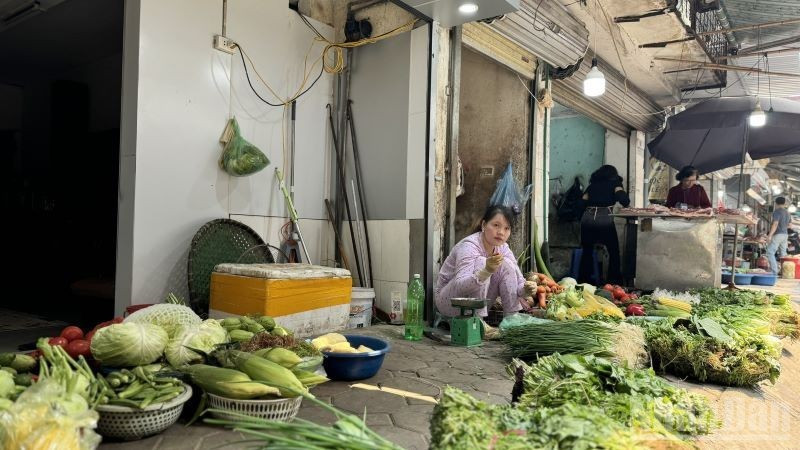Formalising the informal sector – A medium- and long-term solution
Building trust among taxpayers and creating favourable conditions to facilitate tax payment and compliance, alongside tightening penalties for non-compliance, are essential to ensuring tax obligations in business activities — particularly among small household businesses.

Dr. Nguyen Ngoc Anh of the Development and Policies Research Centre (DEPOCEN) highlighted that every economy is a complex entity comprising multiple actors and is typically divided into two sectors: formal and informal. As in many emerging economies, Viet Nam’s informal sector plays a vital role in daily life, with its presence felt across all fields.
At a recent online seminar titled “Formalising the Informal Sector – What Medium and Long-term Solutions?”, participants discussed various aspects of integrating Viet Nam’s informal sector into the formal economy in the current context.
Policy reform must be adjusted in Viet Nam’s specific conditions
Dr. Nguyen Xuan Hai, Senior Economic Advisor at Hathaway Policy (a network of researchers trained at top domestic and international institutions focusing on economics and policy), proposed a medium and long-term plan aiming to transition household businesses into enterprises and informal workers into formal employment. Specifically, the target is to convert 1–2% of household businesses (50,000–100,000 per year) and 1–2% of informal workers (300,000–500,000 per year) into formal status.
To achieve this, he suggested centring employment service hubs to facilitate nationwide recruitment of informal workers, provide training and job-matching services, and guide household businesses through the transition process. These efforts should be implemented in marketplaces and along key streets in informal economic zones across the country.
“It is high time we formalised the informal sector to support an economy that is already large and needs to grow further. In reality, the informal sector creates a legal grey area for both businesses and workers, leading to tax losses and misrepresentation of the economy’s actual dynamics, particularly in resource allocation,” Dr Hai emphasised.
Journalist Hoang Tu Giang noted that in Viet Nam, the informal economy and informal employment have been partially documented by the General Statistics Office (now the Statistics Office), and incorporated into labour and employment surveys since 2007–2009.
According to current statistics, there are 5.2 million non-agricultural household businesses generating over 30% of GDP. Of these, around 1.7 million are registered, while some 3.5 million remain unregistered. This sector provides employment for 8.7 million people — nearly one-fifth of the working-age population. Despite its contribution to GDP, the household business sector accounts for only about 1.6% of state budget revenue.
Journalist Giang pointed out that if tax policies focus strictly on monitoring every transaction via e-invoicing and aim solely at “collecting fully and correctly”, the majority of household businesses in this sector risk being pushed to the margins. Instead, they should be recognised as part of the grassroots economy — a sector absorbing millions of workers who cannot yet access the formal business sector — and be supported with more adaptive and humane policies.
He argued that this sector forms an effective informal safety net, contributing to poverty reduction, social stability, relieving pressure on the state’s social protection system.
Prof. Dr. Giang Thanh Long from the National Economics University observed that Viet Nam’s national digital transformation is progressing strongly — and the informal economy is clearly adapting. Many informal actors have been quick to adopt new technologies in business operations, shifting towards tech-based business models such as ride-hailing services and online deliveries.
Dr. Nguyen Thu Phuong from the Viet Nam Academy of Social Sciences’ Institute of Economics stressed that formalising the informal sector would significantly enhance the efficiency of private and national resource utilisation.
Transparency and clarity essential in policy implementation
In Ho Chi Minh City, recent changes in tax and legal policy, especially those concerning the adjustment or removal of the fixed-tax model, have created pressure on household businesses, small shops, and micro-enterprises. These entities now face new demands around invoicing, tax declarations, and business transparency.
To address these changes, the High-Quality Vietnamese Goods Business Association and the Centre for Business Studies and Assistance, in collaboration with the Viet Nam Chamber of Commerce and Industry – Ho Chi Minh City branch, held a seminar entitled: “Understanding Business Formalisation and Changes in the Fixed-Tax Model – Legal Reforms and Incentive Policies”.
The event helped the small business community stay informed about new legal regulations, understand their rights and obligations, and make informed decisions during the transition period.
Regarding the shift to company status, Nguyen Cam Chi, Director of Sustainable Development Advisory at MCG Management Consulting, affirmed that this is entirely a matter of choice for household businesses and start-ups. In the current context, this shift is seen as part of a broader support and incentive policy.
She noted that while Viet Nam currently has 5.2 million household businesses, the national target is to reach 2 million formal enterprises by 2030. Encouraging household businesses to formalise is therefore an effective approach to achieving that goal.
Furthermore, by using tax-authority-certified e-invoices, household businesses can overcome existing disadvantages in brand development and gain broader access to e-commerce.
Referring to the evolving tax policies and changes in the fixed-tax regime, invoicing, and tax declarations, Hoang Xuan Nam, Deputy Head of Enterprise Management and Support Unit No. 4 under the Regional Tax Department II, emphasised the importance of understanding these changes correctly and responding to them appropriately in line with modern tax governance.








